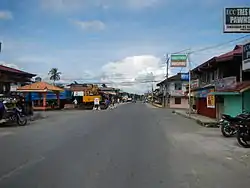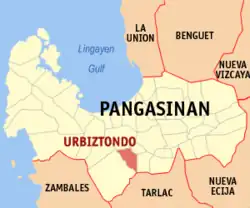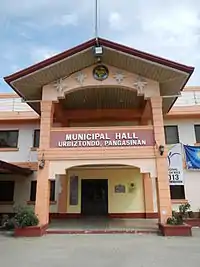Urbiztondo
Urbiztondo, officially the Municipality of Urbiztondo (Pangasinan: Baley na Urbiztondo; Ilocano: Ili ti Urbiztondo; Tagalog: Bayan ng Urbiztondo), is a 3rd class municipality in the province of Pangasinan, Philippines. According to the 2020 census, it has a population of 55,557 people.[3]
Urbiztondo | |
|---|---|
| Municipality of Urbiztondo | |
 Street in Urbiztondo | |
 Seal | |
 Map of Pangasinan with Urbiztondo highlighted | |
OpenStreetMap | |
.svg.png.webp) Urbiztondo Location within the Philippines | |
| Coordinates: 15°49′22″N 120°19′46″E | |
| Country | Philippines |
| Region | Ilocos Region |
| Province | Pangasinan |
| District | 2nd district |
| Named for | Juan Antonio de Urbiztondo |
| Barangays | 21 (see Barangays) |
| Government | |
| • Type | Sangguniang Bayan |
| • Mayor | Hon. Modesto Mejia Operaña |
| • Vice Mayor | Marilyn S. Sison |
| • Representative | Jumel Anthony I. Espino |
| • Councilors | Members |
| • Electorate | 39,344 voters (2022) |
| Area | |
| • Total | 81.80 km2 (31.58 sq mi) |
| Elevation | 14 m (46 ft) |
| Highest elevation | 30 m (100 ft) |
| Lowest elevation | 6 m (20 ft) |
| Population (2020 census)[3] | |
| • Total | 55,557 |
| • Density | 680/km2 (1,800/sq mi) |
| • Households | 12,323 |
| Economy | |
| • Income class | 3rd municipal income class |
| • Poverty incidence | 18.38 |
| • Revenue | ₱ 167.2 million (2020) |
| • Assets | ₱ 384.1 million (2020) |
| • Expenditure | ₱ 127.9 million (2020) |
| • Liabilities | ₱ 82.21 million (2020) |
| Service provider | |
| • Electricity | Central Pangasinan Electric Cooperative (CENPELCO) |
| Time zone | UTC+8 (PST) |
| ZIP code | 2414 |
| PSGC | |
| IDD : area code | +63 (0)75 |
| Native languages | Pangasinan Ilocano Tagalog |
| Website | urbiztondopang |
History
The municipality was named after General Juan Antonio de Urbiztondo y Eguía, the Spanish Governor-General of the Philippines from 1850 to 1853, who was also known as the conqueror of the Muslims in Jolo. He then issued a decree founding the town and consequently the newly formed town was named “Urbiztondo” in his honor. The Municipality of Urbiztondo's establishment as a town was primarily due to Fr. Ramon Dalmau, the parish priest of San Carlos (Binalatongan), who in 1852 began the process for its separation from San Carlos. While the area remained a visita of San Carlos for that year, the town of Urbiztondo was finally established as a separate entity on November 28, 1853, when it was assigned its own curate (parish priest). The Dominicans accepted Urbiztondo as a vicariate in 1855 and assigned Rev. Father Francisco Treserra to the town; he is also responsible for relocating the town to the place where it is now located.
Geography
Barangays
Urbiztondo is politically subdivided into 21 barangays. Each barangay consists of puroks and some have sitios.
- Angatel
- Balangay
- Batancaoa
- Baug
- Bayaoas
- Bituag
- Camambugan
- Dalanguiring
- Duplac
- Galarin
- Gueteb
- Malaca
- Malayo
- Malibong
- Pasibi East
- Pasibi West
- Pisuac
- Poblacion
- Real
- Salavante
- Sawat
Climate
| Climate data for Urbiztondo, Pangasinan | |||||||||||||
|---|---|---|---|---|---|---|---|---|---|---|---|---|---|
| Month | Jan | Feb | Mar | Apr | May | Jun | Jul | Aug | Sep | Oct | Nov | Dec | Year |
| Average high °C (°F) | 31 (88) |
32 (90) |
33 (91) |
34 (93) |
33 (91) |
32 (90) |
31 (88) |
30 (86) |
31 (88) |
32 (90) |
32 (90) |
31 (88) |
32 (89) |
| Average low °C (°F) | 22 (72) |
23 (73) |
24 (75) |
25 (77) |
25 (77) |
25 (77) |
25 (77) |
25 (77) |
25 (77) |
24 (75) |
24 (75) |
23 (73) |
24 (75) |
| Average precipitation mm (inches) | 9 (0.4) |
11.4 (0.45) |
11.1 (0.44) |
5.4 (0.21) |
258 (10.2) |
315.6 (12.43) |
463.1 (18.23) |
663.2 (26.11) |
479.7 (18.89) |
121.9 (4.80) |
75.8 (2.98) |
16.8 (0.66) |
2,431 (95.8) |
| Average rainy days | 4 | 3 | 2 | 2 | 12 | 15 | 19 | 21 | 18 | 12 | 9 | 5 | 122 |
| Source: World Weather Online[5] | |||||||||||||
Demographics

| Year | Pop. | ±% p.a. |
|---|---|---|
| 1903 | 7,416 | — |
| 1918 | 8,538 | +0.94% |
| 1939 | 11,159 | +1.28% |
| 1948 | 15,721 | +3.88% |
| 1960 | 19,594 | +1.85% |
| 1970 | 23,385 | +1.78% |
| 1975 | 24,006 | +0.53% |
| 1980 | 27,348 | +2.64% |
| 1990 | 33,102 | +1.93% |
| 1995 | 35,746 | +1.45% |
| 2000 | 40,089 | +2.49% |
| 2007 | 43,430 | +1.11% |
| 2010 | 47,831 | +3.58% |
| 2015 | 50,170 | +0.91% |
| 2020 | 55,557 | +2.03% |
| Source: Philippine Statistics Authority[6][7][8][9] | ||
Economy
Government
Local government
Urbiztondo, belonging to the second congressional district of the province of Pangasinan, is governed by a mayor designated as its local chief executive and by a municipal council as its legislative body in accordance with the Local Government Code. The mayor, vice mayor, and the councilors are elected directly by the people through an election which is being held every three years.
Elected officials
| Position | Name |
|---|---|
| Congressman | Jumel Anthony I. Espino |
| Mayor | Martin Raul S. Sison II |
| Vice-Mayor | Marilyn S. Sison |
| Councilors | Volter D. Balolong |
| Dyna P. De Guzman | |
| Edwin T. Tamondong | |
| Pepito N. Calugay | |
| Danilo M. Tamondong | |
| Brandy M. Palisoc | |
| Vicente A. Frias Jr. | |
| Jordan Melcho V. Palisoc | |
References
- Municipality of Urbiztondo | (DILG)
- "2015 Census of Population, Report No. 3 – Population, Land Area, and Population Density" (PDF). Philippine Statistics Authority. Quezon City, Philippines. August 2016. ISSN 0117-1453. Archived (PDF) from the original on May 25, 2021. Retrieved July 16, 2021.
- Census of Population (2020). "Region I (Ilocos Region)". Total Population by Province, City, Municipality and Barangay. Philippine Statistics Authority. Retrieved 8 July 2021.
- "PSA Releases the 2018 Municipal and City Level Poverty Estimates". Philippine Statistics Authority. 15 December 2021. Retrieved 22 January 2022.
- "Urbiztondo, Pangasinan: Average Temperatures and Rainfall". World Weather Online. Retrieved 31 October 2015.
- Census of Population (2015). "Region I (Ilocos Region)". Total Population by Province, City, Municipality and Barangay. Philippine Statistics Authority. Retrieved 20 June 2016.
- Census of Population and Housing (2010). "Region I (Ilocos Region)" (PDF). Total Population by Province, City, Municipality and Barangay. National Statistics Office. Retrieved 29 June 2016.
- Censuses of Population (1903–2007). "Region I (Ilocos Region)". Table 1. Population Enumerated in Various Censuses by Province/Highly Urbanized City: 1903 to 2007. National Statistics Office.
- "Province of Pangasinan". Municipality Population Data. Local Water Utilities Administration Research Division. Retrieved 17 December 2016.
- "Poverty incidence (PI):". Philippine Statistics Authority. Retrieved December 28, 2020.
- "Estimation of Local Poverty in the Philippines" (PDF). Philippine Statistics Authority. 29 November 2005.
- "2003 City and Municipal Level Poverty Estimates" (PDF). Philippine Statistics Authority. 23 March 2009.
- "City and Municipal Level Poverty Estimates; 2006 and 2009" (PDF). Philippine Statistics Authority. 3 August 2012.
- "2012 Municipal and City Level Poverty Estimates" (PDF). Philippine Statistics Authority. 31 May 2016.
- "Municipal and City Level Small Area Poverty Estimates; 2009, 2012 and 2015". Philippine Statistics Authority. 10 July 2019.
- "PSA Releases the 2018 Municipal and City Level Poverty Estimates". Philippine Statistics Authority. 15 December 2021. Retrieved 22 January 2022.
- "2019 National and Local Elections" (PDF). Commission on Elections. Retrieved March 6, 2022.
External links
- Urbiztondo Profile at PhilAtlas.com
- Municipal Profile at the National Competitiveness Council of the Philippines
- Urbiztondo at the Pangasinan Government Website
- Local Governance Performance Management System
- Philippine Standard Geographic Code
- Philippine Census Information